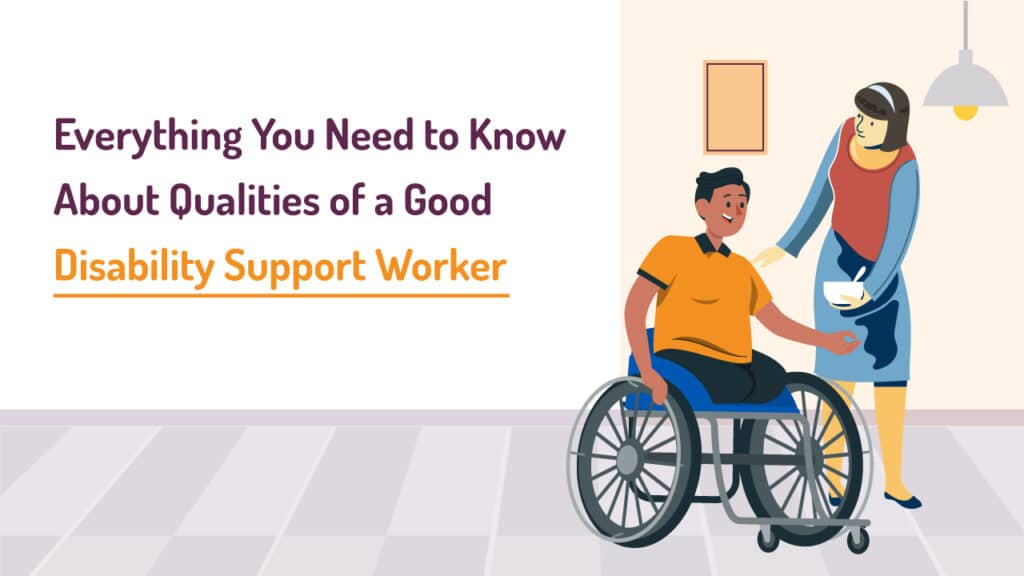It’s a growing industry attracting a wide variety of new workers from all walks of life. But like all careers, some people are more suited to it, and others aren’t the best fit. So what are the qualities that set a good disability support worker apart from an average one?
In this article we’ll have a look at some of the most valuable attributes a disability worker can have, and why they’re important.
Key Takeaways
- Ten of the key qualities of a good disability support worker are Compassion, Communication, Patience, Empathy, Respect, Adaptability, Trustworthiness, Reliability, Positivity, and Training.
- It’s important to have the right attitude towards disability – people don’t “have a disability”. They “live with disability”. Disability happens with our society isn’t willing to accommodate someone’s differences.
- It’s important to start with a genuine desire to make a difference for people living with disability. You can work on the other qualities, but you need to start with compassion.
Qualities of a good disability support worker
So what are 10 essential qualities a disability support worker needs for their role? They need to have:
- Compassion – They need to genuinely care about people with disability, and wish to make a real difference in the lives of their clients.
- Communication – They need good communication to connect with their clients, understand their needs, and help them connect with others.
- Patience & Resilience – They must be sympathetic and supportive of the difficulties faced by their client, and patient when they have bad days.
- Empathy & Understanding – They need to genuinely understand and care about their clients, the challenges they face, and the support they need.
- Respect – They must value clients (and other people), and treat them with the dignity and respect they deserve.
- Adaptability & Flexibility – They must understand each client’s needs are unique and changing, and be ready to adapt and find creative solutions.
- Trustworthiness & Honesty – They must honour the trust which their clients place in them, and always act with integrity.
- Reliability & Organisation – They must be on time, ready for work, and fully prepared for their role.
- Positivity & Encouragement – They must be affirming and encouraging, and help clients build their confidence and achieve their goals.
- Training & Skill – They must have the skills, knowledge and training to perform their role, care for their client, and meet all their legal obligations.
Why are those qualities so important?
So why are those qualities so important for support workers? What is it about those attributes that make them particularly important? Let’s take a moment to look at each one and see why it’s valuable.
Compassion
Compassion is the first quality on the list because it’s where you need to start – it’s about why you’d want to be a disability support worker in the first place. This is not the sort of job you do just to pay the bills – this role is about making a difference in the lives of others.
A disability worker spends their day working alongside clients, assisting them with their everyday tasks, and encouraging them towards better independence and greater wellbeing. To do that effectively, it’s important that you genuinely care about the welfare of the people you’re working with – that you want to see their lives improve, and you feel personal satisfaction when you leave them better off at the end of the day.
You also need to be willing to think about the person’s long-term benefit – part of your job is moving them towards better independence, and helping them meet their life goals. For that, you need to think beyond the everyday tasks and think about how the things you’re doing today fit into the big picture. That requires more than just helping out with everyday tasks.
If you’re working as a carer just to pay the bills and stay in the workforce, there’s a risk that you’ll end up in a “janitor mindset”. That’s when even though your job is fundamentally about people, you see everything they do as creating more work for you. You can quickly end up resenting clients and actively seeking to discourage them from doing new things or changing their routines. And at that point, you become part of the problem rather than part of the solution.
That’s why compassion needs to be the starting point.
Communication
One of the most essential skills needed by any good disability support worker is communication, as it’s vital in almost every part of the job.
Communicating with the client
You must be able to communicate clearly with clients, making yourself understood, and understanding them in return. You must be able to converse with clients who face significant difficulties communicating and be willing to work hard at understanding what they’re trying to express – without getting frustrated at the extra time or effort needed to do so. This may involve learning unfamiliar ways to communicate or coming up with creative ways to express things that work for the client. You may develop your own ways of communicating – such as simple hand signs for a client to request help. In some cases, you may end up becoming a bridge to help them communicate with others – meaning you need to understand what they’re trying to say.
You’ll need to clearly communicate expectations with your client, letting them know what you can and can’t do, when you will and won’t be available, and letting them know when plans need to change. In some cases, you may find yourself dealing with conflict or tension with the client, which can be made more difficult by communication issues. You’ll need to patiently and professionally address their frustrations while keeping good boundaries – so you’ll need good conflict resolution skills.
It’s important that you let your client make their own decisions when they wish to, and give them control where possible – so you’ll need to have good communication about what help they do and don’t need, and when and how they want you to assist. Ultimately, you want to build up trust with your client so they know you’ve got their back and are on their side.
Interested in learning more about our Individual Support courses? Get In Touch Today!
Communicating with others
You’ll probably also be communicating regularly with family, friends, support organisations and community networks – sometimes on the client’s behalf. You’ll need to know how to make sure everyone is on the same page and no one’s getting wrong information. You’ll need to provide organisations like the NDIS with all the information they need.
If they need it and they’re willing, you might also find yourself acting as the person’s spokesperson – either in social settings with family and friends, or even as their advocate in a more formal setting. This might be a regular occurrence, or only when needed – in some cases, you may have an agreed signal the client can use to ask you to step in and help. In official situations, you need to understand what the person wants and needs and be able to communicate that clearly. In social settings, you might be acting as a bridge to help your client connect with others.
You may also find yourself in the middle of conflict between the client and others – you can sometimes find yourself navigating complicated tensions with family as the person’s level of independence grows and their dependence on family members shifts. In all these situations, you need to ease communication, act on the client’s behalf where needed, and remain professional. This can again require good conflict resolution skills.
Just communicating
Ultimately, this job isn’t just about getting tasks done. You’ll be spending a good amount of time with the client, so you’ll want to build up a rapport. Work out their interests, and be able to talk with them about things that interest you both. The best support workers don’t find relating to their clients a chore – they build connections so that at the end of the day, you both feel better off for having spent time together.
For all these reasons, good communication is one of the most vital and useful tools in your toolkit, and essential to doing the job well.
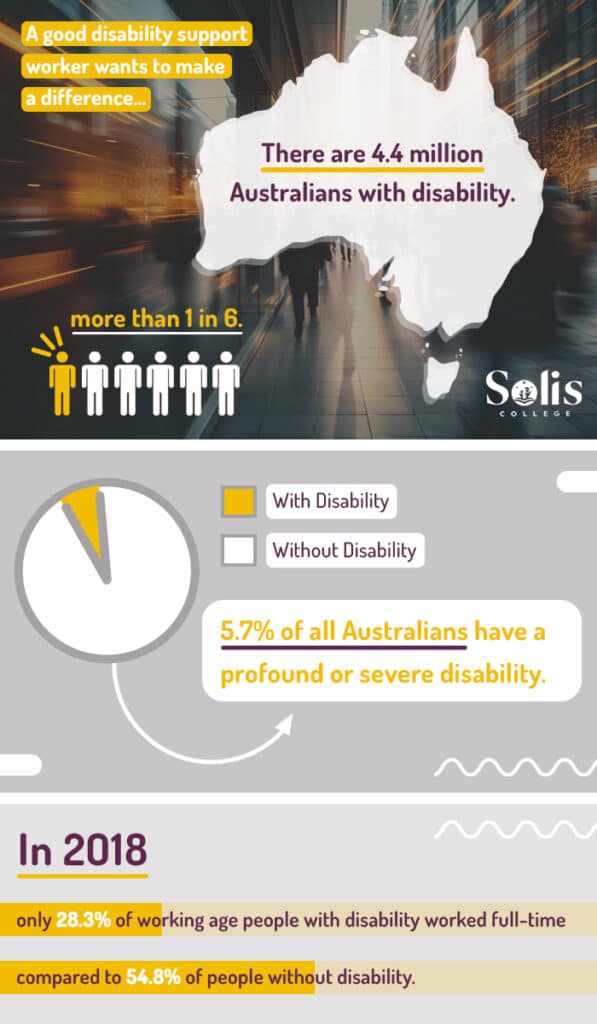
Patience & Resilience
Patience is another essential skill for a disability support worker. A key part of the job is assisting people with everyday jobs that they find difficult, or helping them learn new skills and new ways of doing things. Both these can require a lot of patience – as any parent could tell you. If you’ve got a short fuse and get easily frustrated when people take longer than you expect to complete tasks or learn new things, you may not be the best fit for this job.
You need to create an environment where clients have the space to work through tasks at their own pace, without judgement or criticism. Many people living with disability face more than their fair share of judgement when they find tasks difficult. Their home environment should be a place where they’re free from criticism and can be themselves. As a key part of their home life, it’s important that you help them to feel safe around you to take their time and get things wrong. Your goal should not be to get stuff done, but to help the client achieve their goals – whether that’s getting a little better at something they want to learn, or even just getting through their day without needing to lean on their family for help.
Remember that people often learn and perform best when they feel safe to try – and fail.
You also need to give clients the space to have bad days. This might mean they struggle more than usual, or it might mean that they get frustrated with you and say things they shouldn’t. You need to be a little thick-skinned, be patient with them, and allow them to have a bad day. Although there’s nothing wrong with talking about good boundaries when things are more settled again.
Lastly, a sense of humour can be an incredibly useful tool, both for responding well when a client struggles or behaves badly, and for helping the client not take failure to heart. Just make sure you’re always laughing with the client – never at them!
Empathy & Understanding
Another key quality that every disability support worker should have is empathy – being able to mentally place yourself in your client’s shoes and gain some understanding of the challenges they face and how they feel. We can’t expect to fully understand what it’s like to live with disability, but we can think through some of the difficulties a client might be facing and consider how that might be affecting them emotionally. We can also ask respectful questions and listen carefully to the person’s answer, and work hard not to just make assumptions.
Remember to pay attention to more than just their words – verbal cues can sometimes tell you a lot. But understand that body language is different for different people (particularly when you’re working in the disability sector), and again – don’t make assumptions until you’ve taken the time to understand how the person communicates. A good disability worker takes the time to understand their client, and soon becomes good at picking up on their more subtle signals.
As someone who’s working with clients in their homes and sometimes in some of their more vulnerable moments, it’s critical that you show the person you understand where they’re at and you’re on their side. They should feel at home in your company – literally!
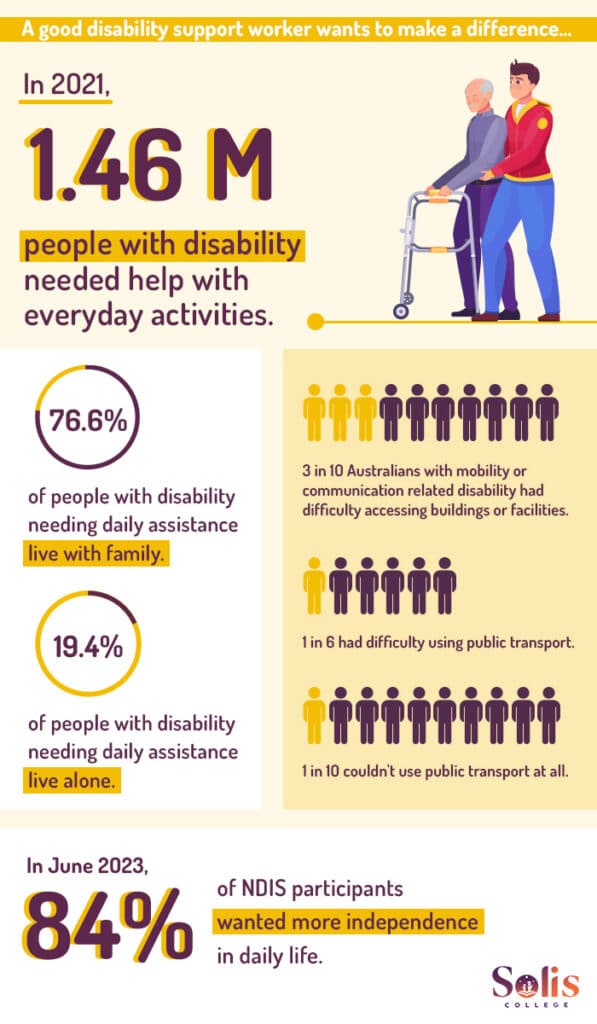
Respect
This is a need most people have but is particularly vital when working in disability support. You must value your client as a person and be respectful of their needs, their wishes, their privacy, and their rights. Even when you see clients at their worst or you have a very strong understanding of their limitations, you should be doing everything you can to ensure you give them the same respect you’d give anyone, and encourage others to do the same.
Although a disability support worker can often be required to act on a client’s behalf, you should only speak for them with their permission and respect their right to make decisions for themselves. A big part of your role is to help the person towards greater independence – so it’s very important that you don’t take away their choices.
This can be particularly important if a client is from a culture widely different from your own. You might be working with clients from any number of backgrounds, and their worldview may be very different to yours. When those cultures don’t align and you don’t agree with a client’s decision or their reason for it, you need to remember – they’re the client. It’s their choice, and you need to respect their decision.
Adaptability & Flexibility
If you’re looking for a career where you can expect the same thing every day, and the goal is always fixed, you may find this industry very challenging. Disability support work is the kind of role where every client is different, with different needs and different goals. It’s also the sort of job where the goalposts can move easily. A new piece of assistive technology, new medication, a client’s disability becoming more severe over time, or the client learning a new way to do a task can all permanently change the client’s needs and your day-to-day workload. A client’s goals can be met and new ones set, a goal might become unachievable, or the client may simply change what they want. All of this means that one of the most critical qualities a disability support worker can have is adaptability and flexibility.
For starters, your everyday workload might vary from day to day – depending on a client’s specific needs. Sometimes this will be easy, but sometimes you’ll need to help a client with a new challenge – which will require adaptability, and possibly some creativity to find a solution. It’s also important for you to remain positive – and calm if you’re under pressure. Many clients may be inclined to feel anxious or overwhelmed by challenges, and part of your job is letting them know it’ll be OK and helping them find a way forward.
These ideas also apply to larger changes. When a client’s level of mobility or access to assistive technology changes, or they need to move home, or the regulations around the assistance they receive are revised it can be a big cause of anxiety. You need to make sure the client feels supported and help them through the change where you can.
It’s also worth remembering that being a good individual support worker sometimes means going the extra mile. Sometimes a client will have special needs, such as an event or activity outside your normal hours that they want your help with. You might not be officially required to work those extra hours, but the best disability workers understand there’s more at stake than just work hours. This is a relationship, and you’re being asked to help someone in need. You need to be adaptable enough to cope when the job throws something unexpected at you – because it will!
Interested in learning more about our Individual Support courses? Get In Touch Today!
Trustworthiness & Honesty
One of the key things you’ll want to establish with any client is trust. You’ll likely be assisting clients when they’re at their most vulnerable, and may find yourself speaking and acting on their behalf. For the client to feel safe about those things, they’ll need to know they can trust you – and that’s something you’ll need to earn.
Act with integrity, keep your word, follow through on your commitments, and tell your client the truth – without being blunt or hurtful. Some of these things may seem trivial – why would it matter if you lie about why you’re late to work? But the reality is, it’s often by being trustworthy in small things that people know you can be trusted with big things.
If you never tell embarrassing stories about other clients, they’ll probably trust you’ll never share their embarrassing moments with others. If they know you don’t lie – even to cover your own mistakes – they’ll be more likely to trust your word about bigger things. If they can trust you to speak for them and respect their wishes when the family is planning a birthday party, they’ll know they can trust you to communicate with organisations on their behalf.
Reliability & Organisation
Being organised isn’t everyone’s gift, but it’s an important one for a disability support worker. Clients are depending on you to assist with their everyday needs, and some won’t be able to get their day started until you’re there to help. If you’re late, or you show up unprepared, their day is delayed. It can also be a problem for friends or family who may feel obliged to help out in your absence – making people late for work and causing stress all around. This can burn up any goodwill you have with the client and their family very quickly!
Make sure you’re there for your client when and where you told them you would be – or a little early if possible, to allow for unexpected delays. Be ready for work with everything you need to get started. If you’re delayed, or there are issues with your availability when you’d normally be there, make sure you’re communicating very clearly with the client and anyone else impacted – and don’t make a habit of it.
Being a disability worker also requires a fair bit of admin, which can be essential to things like NDIS funding. Although it might not be the most fun part of the job, making sure you fill out your paperwork and do all your reporting is a vital way to care for your clients – making sure they continue to get the support they need.
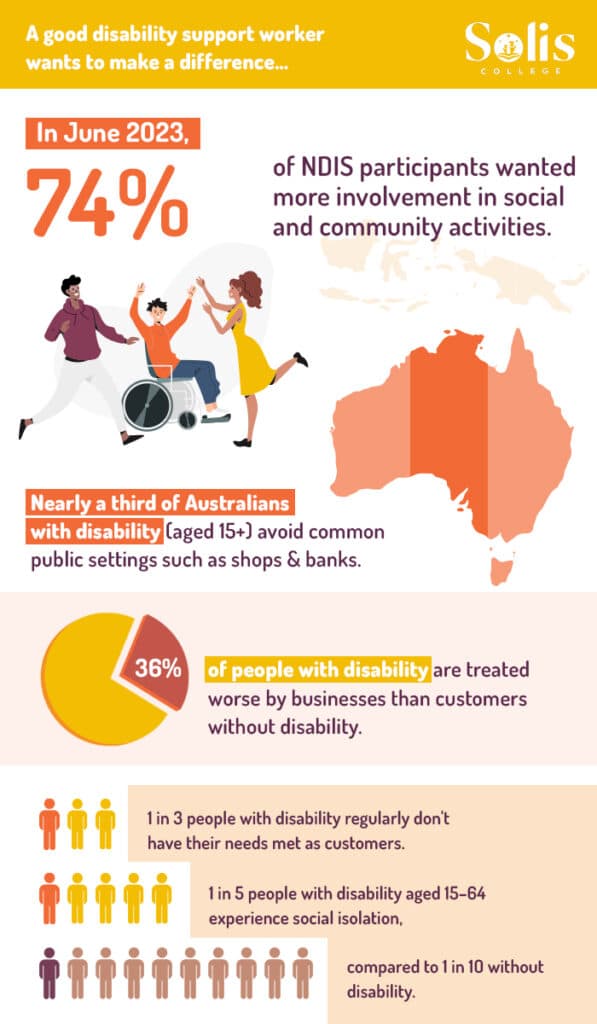
Positivity & Encouragement
One of the key tasks of a disability support worker is to help clients towards better independence, but there’s more to that task than simply helping them learn new skills or use assistive technology. Part of the battle is mental, helping them overcome negativity or fear that may have been built up over many years. As such, you need to be a source of positivity and encouragement for your client. Support work isn’t just about physical support – sometimes providing emotional support will be just as important, if not more.
Make sure you’re giving your client a steady flow of positive affirmation. Help build up their self-esteem and confidence, and remind them of what makes them awesome. Encourage them to give things a go and not give up. When they reach their goals, give them plenty of validation – let that be an encouragement to strive for other goals, and keep working. Sometimes no one knows what your client is capable of until they try.
Training & Skill
Although qualities such as empathy, patience and communication are essential tools for disability support work, there are some more practical areas of knowledge that are also very important for the role. First, you need to have an understanding of the client’s disability, how it affects them, and what impairments it may cause. This is important for providing the right care for a client and knowing the less obvious pitfalls to avoid when caring for them.
It’s also important to know the different services and supports available for your client – you may need to help your client understand what options are available and what they need to do to access them.
Also, you will need to know the legalities of their situation, including their rights, what they are and aren’t entitled to, and your obligations to them. This might be to advise them how and when to invoke their rights and claim what they’re entitled to, but it also shows you when others are taking advantage of your client or acting in a discriminatory manner and equips you to speak on their behalf.
Previously when disability workers weren’t formally qualified, these issues could be tricky as knowledge varied greatly from worker to worker. Nowadays, we have specific qualifications for the industry, and most disability support worker jobs require potential staff to have a Certificate III in Individual Support (Disability) at minimum. This provides much of the baseline knowledge that workers need for the role.
Some more senior roles may require a more advanced qualification such as a Certificate IV in Disability Support or even a Diploma of Community Services. But the certificate 3 is normally all that’s needed to get your start in the industry.
In addition to the formal training, being a disability support worker is a career where a range of different skills might be of help. Technical skills can be useful in helping the client with everyday technical tasks – or give you a leg up in understanding some assistive technology. General life skills such as cooking and gardening can be valuable to help out, and could potentially be taught to a client. Even hobbies can be a great asset if your client has the same interest – or a willingness to try new things.
And ultimately, a good support worker should always be willing to learn.
Attitude is important – do they “have a disability” or “have disability”
It’s not exactly a skill or a quality, but if you’re considering work in the disability field, it’s also important to consider how you view the idea of disability. The perception of disability has changed significantly in recent years, and while previously disabilities may have been as a matter of misfortune – or at the very least a crippling condition or disease to be cured if possible – this is no longer the case.
In recent times we’ve shifted the way we think and speak about disability. We no longer talk about someone “having a disability”, but rather about a person “having disability” or “living with disability”. This may just seem like semantics (like arguing whether Jennifer Lawrence is an “actor” or an “actress”), but in reality, there’s a big difference between the two. It’s about what we call the social model of disability.
The social model of disability
For many years, disability has been viewed as something innately linked to the person – a disadvantage the person may have been born with or suffered in an accident that is now part of who they are. A limitation they carry throughout their life. In years gone by this may have been viewed as a divine judgement or curse. In more recent years it has been viewed more as a medical condition to be cured if possible. You may be nodding along and thinking “Yes, that sounds right” – because a lot of us grew up with this thinking.
The social model of disability sees things differently. It sees disability as something applied by society, not belonging to the person. All people are created equal but unique. Society chooses to care for some more than others. Disability happens when society makes allowances for some people, and not for others.
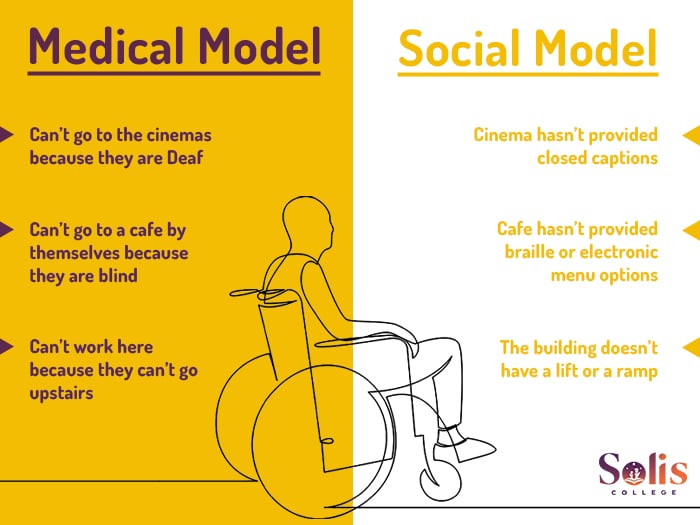
Now, this might seem like an odd idea to you. The idea of a disability being part of the person might be so logical that the idea of disability being a societal problem seems like nonsense. But let’s think about it for a moment.
Around half the population of Australia wears glasses. Many of these were born with vision issues. Some developed them later in life. Others suffered an accident and acquired a vision impairment. Sound familiar?
Now, we normally don’t think of people with glasses as disabled, as they rarely suffer significant ill effects from that impairment and we don’t have to make any special allowances. There’s readily available technology that basically removes the impairment, so you never even notice.
But what if glasses and corrective lenses didn’t exist? Or if the government taxed them at an outrageous rate, so a pair of glasses cost more than five figures? There’d be a lot of the population that might suddenly be classed as disabled. Many couldn’t drive safely. Many couldn’t read. Suddenly there’d be a whole lot of people needing large print documents, or depending on public transport.
The reason we don’t regard half our population as being mildly disabled isn’t actually because of their impairment. It’s more because nobody needs to make allowances for them, because they have freely available assistive technology. It’s because there are tools in place for them to thrive.
That’s what the social model of disability is based around. Disability isn’t about someone having a physical or mental impairment. It happens when our society isn’t willing to provide the tools or put in the effort to help the person. When making accommodations for someone’s differences is too much effort or cost.
If you want to work as a disability support worker, it’s very important to approach it with the right attitude. They don’t have a disability. They experience disability when our society isn’t willing to make accommodations to help them. That’s where you come in.
Interested in learning more about our Individual Support courses? Get In Touch Today!
What makes someone a BAD disability support worker?
Having looked at the many qualities needed by a good disability support worker, it’s worth pausing just for a moment to ask the opposite question – what does a bad disability worker look like?
After discussing this question with disability support workers currently in the industry, one answer emerged very clearly – they felt the worst disability support workers are the ones who simply aren’t present for the client. Who are simply there to pay the bills, and don’t make any effort to engage with the people they’re caring for, or support them beyond the bare minimum.
“It’s heartbreaking when you go to the park, and see a client there on their own with a carer who’s just scrolling on their phone”, said David, a support worker in Adelaide’s southern suburbs. “You have these awesome people who deserve respect and care, and you have the chance to invest quality time into them and support them, and they’re off playing Candy Crush.”
Being a disability support worker is all about caring for people with unique challenges and leaving them better off than when you arrived. It’s about wanting to help someone meet their goals, and giving them the support to live a more fulfilling life.
If that’s not something that interests you, then it probably doesn’t matter what other qualities you might have.
Would I make a good disability support worker?
Many questions factor into the decision to move into disability care, such as what disability support actually involves, what work is available, and how you get started. But the question of “Would I be good at the job?” is one of the best ones to start with.
As we’ve seen, there are many qualities that make up a good disability worker. Now, not every worker is going to have all these qualities in abundance. Some aspects of the job will be harder for certain workers than others. Some will need to work harder on organisation than others. Others like long-term planning, and being adaptable and flexible is more of a challenge. Few people love conflict, or having their patience put to the test. It’s ok to have some qualities in abundance and others you need to work on.
Ultimately, many of the skills and qualities of a good support worker can be developed and improved on. But probably the essential quality you need to begin with is a real compassion for people living with disability, and a genuine desire to make a difference in their lives. If you have that, then you have a reason to work on the other qualities. If you don’t… this might not be the career for you.



